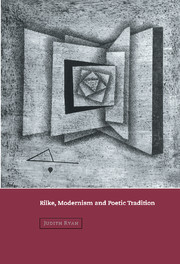Chapter 4 - The modernist turn
Published online by Cambridge University Press: 22 September 2009
Summary
Rilke's shift to abstraction is accompanied by continuing reflections on the nature of poetry. His modernism has two faces: it moves, on the one hand, toward a concept of poetry as essence that extends the Symbolist notion of ‘pure poetry’, and on the other, toward a revival of the classical German poets' elegiac invocation of more coherent traditions. The boldly compressed and elliptical effects that become increasingly evident in Rilke's poetry owe much to the spare, hermetic poetry of Mallarmé. In the early nineteen-twenties, Rilke discovered Paul Valéry, whose poetry he read and translated with profound admiration. The emphasis of both French poets on that which cannot be adequately rendered in language and on that which is not represented in visible, audible, or tangible reality held great appeal for Rilke. Rilke found new confirmations of his earlier concept of the ‘leere Mitte’ (empty centre) in the French poets' obsession with silence and absence. By the same token, his interest in the transformation of reality through the creative imagination found equivalents in the French poets' free transposition of one sensory impression into another.
As early as 1913, Rilke had read Wilhelm Worringer's book, Abstraktion und Einfühlung [Abstraction and Empathy] (1908). For Worringer, the two terms of his title were polar opposites. Abstraction was not so much a modernist phenomenon as a tendency present in art of many periods.
- Type
- Chapter
- Information
- Rilke, Modernism and Poetic Tradition , pp. 156 - 218Publisher: Cambridge University PressPrint publication year: 1999



